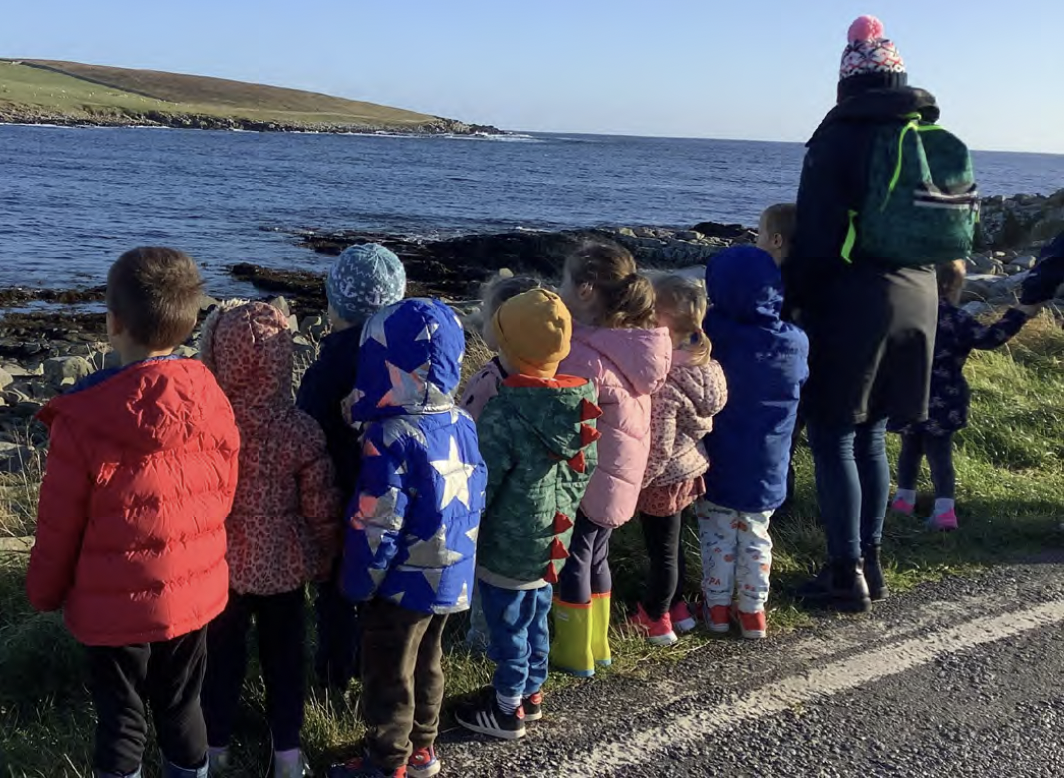Out to Play - caring for our outdoor spaces
Guidance to make the most of the outdoor spaces your early learning and childcare settings use and caring for the environment through embedding Learning for Sustainability. This guidance supports practitioners to provide high quality outdoor play experiences.
Executive Summary

This guidance is part of the to Play series that aims to support Early Learning and Childcare (ELC) practitioners to provide great outdoor play experiences for our children. Caring for Our Outdoor Spaces is about making the most of the outdoor spaces your ELC settings use and caring for the environment through embedding Learning for Sustainability (LfS). It has been developed to complement the original Out to Play guidance.
Relationships are key to the effectiveness of caring for any outdoor space. We know that relationships matter between children and adults and that these relationships need to be nurturing, caring and empowering. We also know that when outdoor play is happening successfully, children and staff have develop a strong relationship with the places where they play. They have an emotional and spiritual attachment to the land and a sense of belonging to, and being part of, nature which motivates them to care for their environment.
Why we need this guidance
It’s a really exciting time for ELC and outdoor learning in Scotland. Outdoor play and learning is already an integral, everyday part of ELC. More and more settings are now fully outdoors or expanding their outdoor facilities and experiences to increase children’s opportunities for quality outdoor play and learning.
As outlined in ‘Best Start’, the Childcare Strategic Plan, it is our vision that children in ELC will spend as much time outdoors as they do indoors, and that time outdoors will happen every day, in every setting. We also set out our commitment to work with our partners to build on the range of outdoor learning support for providers that we put in place during the pandemic.[1]
There is clear research, evidence and recognition about the benefits of outdoor play, especially in natural spaces. This includes physical, social, emotional, cognitive and spiritual benefits, as exemplified in the Inspiring Scotland (2018) Scotland’s National Outdoor Play and Learning Position Statement.
How we manage and care for our outdoor spaces reflects our values and understanding of a pedagogy[2] that embeds LfS. With increasing use, our outdoor spaces are at risk of detrimental wear and tear. This can reduce the play and learning possibilities for our children and impacts on the biodiversity of the space – that is the range of wildlife, including plant life, that inhabit these spaces, even in urban areas.
In addition, the environmental and climate challenges that we currently face – now and in the foreseeable future – are significant and serious. We are having to learn creative approaches requiring new ways of thinking and acting, using LfS as the context. It is important that professionals working with children have the capability to do this very well so that we and our children feel empowered to shape our future.
Who is this guidance for?
This guidance is written primarily for all professionals working with children in ELC and at early level in schools. This includes ELC practitioners, childminders, teachers working at Early Level, playworkers and practitioners who work in Out of School Care (OOSC) for young children. Throughout the guidance, the term ‘practitioner’ is used to collectively represent the workforce.
While the guide is primarily aimed at ELC settings and early primary, much of it is relevant for others providing play experiences in an outdoor environment. It will also be of interest to decision makers with responsibilities for developing outdoor play and learning and/or sustainable cultures and approaches.
How to use this guidance?
This new chapter of Out to Play guidance has been published online in order to uphold our commitment to environmental sustainability. Practitioners will be able to download relevant sections of the guidance and to access links to helpful resources.
Contact
Email: outdoorELC@gov.scot
There is a problem
Thanks for your feedback